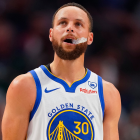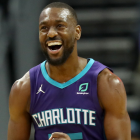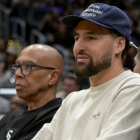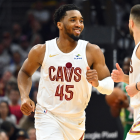
In this week's edition of the Friday 5 with Ken Berger, the CBSSports.com senior NBA writer talks what went on in Lakers camp, Kobe Bryant and double-standards, and whether the NBA can allow Royce White to deal with his anxiety. You can follow Ken on Twitter at@KBergCBS.
1. You've been out in LA with the two dynamos at Staples. What's something that's not a big headline that you've noticed and been impressed by?
KB: The most interesting thing I saw was how the Lakers' coaching staff is installing the Princeton aspects of the offense and the set plays they're keeping from last year's system. On one court, assistant Eddie Jordan was running through the Princeton stuff in five-on-oh drills. It was much crisper in the second of two practices I watched. On an adjacent court, assistant Steve Clifford was running five-on-oh drills with the aspects of last season's offense that the coaches have decided to keep. So right there, on dueling practice courts, you could literally see the blending of the old and the new. Pretty cool.
2. In your column Thursday on Howard and his teammates' perception of him, Kobe Bryant talked a lot about double standards. Isn't it a bit easier for Bryant to point fingers when he manipulated his way onto the most successful franchise in history, then watched as they pulled in Pau Gasol, Metta World Peace, Steve Nash, and Dwight Howard? I mean, good on the Lakers, but Bryant's had to endure, what, three tough seasons? Maybe five?
KB: Well, that is one viewpoint on Bryant, and you're entitled to it. But I have two problems with that. First, the double-standard Kobe was referring to had to do with the backlash against athletes when they try to change teams. He was saying that it's OK for ownership and management to trade and waive players, but when the players want to leave, it's not OK. I agree that athletes' images sometimes get unfairly tainted in these situations. The counter-argument would be that NBA players should have to wait until they're actually free agents -- not a year or two away -- before they start trying to dictate trades. But that's the system we have, and the owners didn't do anything to change it in the new CBA. If anything, they made it worse. As for Bryant only having to endure a few bad seasons, he's been very fortunate to be a Laker -- which he never would've been, of course, had he not refused to play for the Charlotte Hornets. So touche on me. Bryant did take the first steps toward trying to force his way out of LA in 2007, but has since been rewarded for backtracking and staying the course. That's OK with me.
3. You're right that winning cures all, as it did with LeBron, but even though Dwight skated off into the sunset with everything he ever dreamed of as a result of his behavior, do you think there will be any retribution for the players and the nonsense they've pulled over the past three years? I'm tempted to point to the lockout, but I think we both know the players could have been saints and the league still would have come after their pocketbooks like the Artful Dodger in Oliver.
KB: This is the irony and duplicity of the lockout. The NBA for years had a system that encouraged free agents to stay home. But the difference between what a prospective free agent can get from the home team vs. what he can get by switching teams has shrunk. It now amounts to one year and 3 percent on the annual increases. For free agents in their prime, that amount of money can simply be made up on the back end in the first year of their next contract. Similarly, the home team's leverage has diminished because there's no longer any incentive for a free agent to agree to a sign-and-trade. Of course, none of these big-time free agents of late -- LeBron James, Chris Bosh, Carmelo Anthony, Deron Williams -- has taken less money to leave town. The impending free agency of Dwight Howard and Chris Paul -- especially Paul -- will be an interesting litmus test of the new system.
4. Floppity-flop-flop, Ken. The league's abuzz with word of the new policy on flopping, which you reported on last week and which became official this week. There's a lot of speculation the league will only crack down on highly criticized (i.e. blogged about) flops on national TV. How thorough do you think the NBA will be in seeking out offenders? More importantly, do you think teams will be sending in video? Because if so, Mark Cuban's going to need to increase his Dropbox size.
KB: There are a lot of unintended consequences of this new rule, not the least of which is that it will give teams more reason to badger the league office and flood Stu Jackson's office with video. I think Cuban can afford the extra bandwidth and Dropbox storage that will be needed, but you raise an interesting point. Since flops will now be subject to punishment, won't this new rule simply draw more attention to them -- making the practice even more of a controversy? To this, the league may just smile and cue the circus music. There's no such thing, after all, as bad publicity.
5. You and I both wrote on Royce White this week, in different ways. And I'm honestly not sure if the kind of attention being brought to the situation is better or worse for raising awareness and understanding of the condition. I'm sensitive to the Rockets' position in having to set standards for their players, and part of me wonders if at its core, this situation is untenable, not because of the character or nature of White as has been suggested, but the nature of the business itself. Can the NBA and these kinds of conditions really coexist with the pressures that are inherent?
KB: I don't want to play amateur psychologist, but my very rudimentary understanding of this condition is that having White in the environment that triggers his anxiety actually is good for his treatment. This is different than, say, when Delonte West was dealing with bipolar disorder. That's a very different condition -- not better or worse, just different -- that a basketball team really isn't equipped to treat or manage. As Dr. Richard Lustberg mentioned in my column, it's about time sports teams gained a better understanding of conditions like this. The ones that become better at understanding their players' mental health as well as they understand their physical health will not only raise awareness, but create an environment where their players can perform better. Will it work? That's the question. I give the Rockets an awful lot of credit for trying.

















